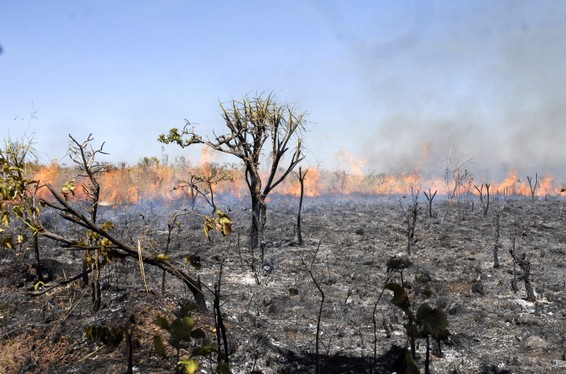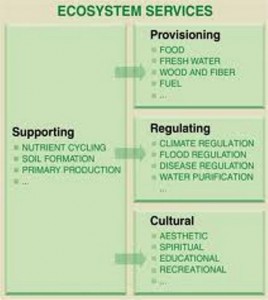Will valuing natural capital protect the environment?
Why Green Economy? blog
Dario Kenner, 26 June 2013
Summary: An increasing number of governments and institutions including the World Bank are backing the valuation of natural capital. They argue nature needs an economic value to ensure it is protected. But there is fierce criticism against ‘pricing nature’ and questions over valuation methodologies. If natural capital is adopted internationally it could be a key pillar of the emerging green economy.
 An ecological crisis is taking place around us. By some estimates we have lost 28% of global biodiversity since 1970 and species are becoming extinct at an unprecedented rate. Many of us know this is happening but we are rapidly running out of options to deal with the crisis.
An ecological crisis is taking place around us. By some estimates we have lost 28% of global biodiversity since 1970 and species are becoming extinct at an unprecedented rate. Many of us know this is happening but we are rapidly running out of options to deal with the crisis.
Maybe one potential solution is the concept of ‘natural capital’. Environmental economists have been working on valuing nature for decades but only now is the proposal being taken up more widely. The basis of the natural capital approach is that we currently receive everything from nature for “free”. This includes food, fresh water, pollination, climate regulation and soil formation.
An economic value needs to be placed on the ecosystem services humans receive from nature, otherwise the environment will continue to be destroyed because it is valued at zero. The idea is if governments and companies are aware of the full economic value provided by the environment they will be able to make informed decisions on the impact of their activities.
One of the key projects promoting natural capital is The Economics of Ecosystems and Biodiversity (TEEB) which published a key landmark study in 2010. The study was backed by the The German Federal Ministry for the Environment and the European Commission.

In their April 2013 report on the top 100 externalities of business TEEB for Business Coalition estimated that major global industries have US$7.3 trillion worth of externalities (effects of their operations on third parties and the environment, such as greenhouse gas emissions and negative impacts on fresh water).
The most startling conclusion is that if nature did have an economic value and the costs of environmental damage were accounted for, then the profits of sectors like oil, gas, agriculture, forestry, cement and steel “would be wiped out”.
The business case being put to the private sector is that it is in their interests to use their natural capital assets sustainably in the short-term as a way to guarantee long-term profits. By depleting natural capital now they put their supply chains and future productivity at risk.
Valuation methodologies and pricing
Although a lot of work is going into developing valuation methodologies (based on Total Economic Value), there are still unanswered questions about how valuing natural capital would work in practice.
- How will natural capital be measured and quantified? Holistic measures of ecosystem functions? Units based on weight and volume?
- Will theoretical models or market demand determine prices?
- How will valuation affect trade-offs between satisfying immediate needs and conservation for future generations. e.g. conserving a forest to capture carbon dioxide instead of using it as a source of food
- How will monetary and non-monetary values work in practice?
- How will prices interact between ecosystem services? Would this mean that one form of natural capital is protected more than another?
- Whose valuation methodology will be used? Environmental economists or local communities?
- Will there be a standardised international approach to natural capital accounting? Consistency and transparency in valuation techniques across borders could facilitate the adoption of natural capital by governments and companies who want to continue or begin including natural capital in their accounts.
Even if the methodological problems around valuation are solved, it is debatable to what extent companies would listen to the natural capital argument because currently they are driven by pressures to deliver immediate returns to investors (the case for ‘unburnable carbon’ faces the same challenge).
Selling nature?
Will valuation lead to the privatization of nature? Economists such as Pavan Sukhdev see natural capital as the best way to convince governments and the private sector to protect the environment given the urgent need to address the ecological crisis. Other academics agree that valuing nature is necessary and that it should not be confused with commodification.
 At last year’s Rio+20 conference the final declarations of some civil society movements and indigenous peoples strongly rejected the natural capital approach. They insist that nature has an intrinsic value which is priceless and that natural capital will be a new area for financial speculation. They ask why natural capital needs to be measured if the objective is not to make it into a commodity.
At last year’s Rio+20 conference the final declarations of some civil society movements and indigenous peoples strongly rejected the natural capital approach. They insist that nature has an intrinsic value which is priceless and that natural capital will be a new area for financial speculation. They ask why natural capital needs to be measured if the objective is not to make it into a commodity.
Civil society movements criticise biodiversity offsetting whereby an actor can pay compensation for environmental damage by buying credits based on preserving or restoring another area of biodiversity. Critics also see the mechanism to reduce deforestation called REDD+ as a precursor to valuing natural capital so it can be sold on a global market.
They also warn of more land grabs. The issue of who controls land will be crucial in the years ahead. For investors to have confidence in potential natural capital investments they will want property rights to be clarified over the areas they invest in. This raises the question of what safeguards would need to be in place to protect community land rights and how effective they would be in practice.
Final thoughts
One year on from Rio+20 there are no signs that the global economy based on resource-intensive extractive industries will reduce its negative impact on the environment. If governments can be convinced natural capital can deliver economic growth they might consider it as a way out of recession and to pay off deficits. And if business makes the connections between their environment-based supply chains and long-term profits they could start to include natural capital in their company accounts. But for natural capital to be embraced – and implemented – questions about valuation methodology need to be answered.
Even if natural capital is adopted globally will it fully address the ecological crisis? Or will it just create a new market based on the environment’s services and allow nature to be continually degraded as some parts of civil society warn? All we know is that the outcome of debates on valuing nature will be central to the type of green economy we see in the future.
For more perspectives on natural capital click here
——————————–
Timeline: Signs of increasing support for natural capital accounting
2005: Millennium Ecosystem Assessment highlights that ecosystems offer a wide range of services that significantly contribute to human well-being.
2010: TEEB publishes a Synthesis Report on the importance of valuing natural capital. Read a summary of the TEEB study.
2010: The WAVES (Wealth Accounting and the Valuation of Ecosystem Services) partnership brings together developed and developing governments together with UN agencies to develop natural capital accounts. Read a summary of Moving Beyond GDP
2011: TEEB study and natural capital are core parts of the landmark United Nations Environment Programme Green Economy Report which sets out one vision for the green economy. Read a summary of the report
February 2012: UN Statistical Commission establishes System for Environmental-Economic Accounts (SEEA) which is taking forward work to standardise natural capital accounting using environmental statistics on water, energy, forest, and pollutants.
June 2012: Private sector representatives sign the Natural Capital Declaration and Natural Capital Leadership Compact at the Rio+20 Sustainable Development conference. Brazilian Business and Ecosystem Services Partnership launched.
April 2013: The International Monetary Fund and the World Bank facilitate meetings on natural capital accounting with representatives from 25 countries.
Also in April: The World Business Council on Sustainable Development publishes Eco4Biz, which brings together a wide range of existing tools to help businesses measure their environmental impact and value natural capital in their supply chains and operations.
June 2013: Legislators from 16 countries and the European Parliament call on governments and business to fully adopt natural capital accounting by 2020. They also call for a Post 2015 Development Goal on Natural Capital Accounting. GLOBE is tracking progress on natural capital accounting in Botswana, Colombia, Costa Rica, Georgia, Germany, Peru, Philippines and the United Kingdom.
Currently Sixty six countries and ninety companies back natural capital accounting. They include the United States, Brazil and South Africa as well as Citi, Wal-Mart, Anglo American, Nestlé and Coca Cola.

Well done in demystifying the subject, Dario. The argument of (& certainly the appeal of) pragmatism underlying capitalism + rise of regulatory capitalism would suggest that valuation/ monetisation is helpful, when the focus is to create dialogue among powerful but apathetic stakeholders. Beyond that, the trade-off between theoretical rigour and application widens.